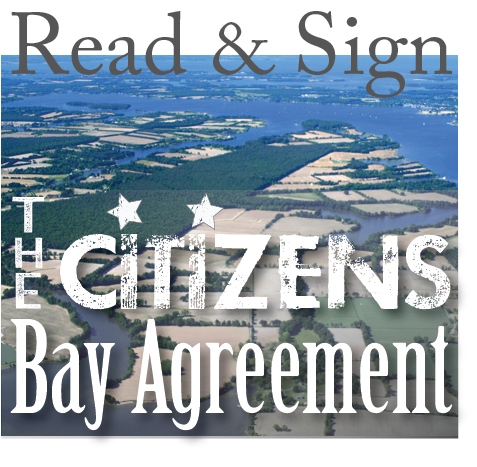Chesapeake Bay Action Plan
After decades of effort, the voluntary, collaborative approach to restoring the health and vitality of the Chesapeake Bay— the largest estuary in the United States—has not worked and, in fact, is failing.
A diverse group of 57 senior scientists and policymakers have joined forces to save the Bay. This is our plan.
What Can Each of Us Do To Save the Bay?
(Posted by Gerald Winegrad)
On December 9, 1983, 27 years ago, I was one of 700 enthused, hopeful participants to witness the signing of the first Chesapeake Bay Agreement. The Governors of three states and other officials solemnly committed to restore the Bay and the Bay Program began. I was there as a member of the tri-state Chesapeake Bay Commission and was then a Maryland State Senator.
Despite 27 years of efforts, the Bay recovery is badly lagging and living resources are declining.
Why Chesapeake Bay is the Best Studied Estuary in the World
(Posted by Bill Dennison) Chesapeake Bay is one of the best studied coastal regions on the globe. There are several reasons for this intensive research effort. 1) Chesapeake Bay has and continues to be incredibly productive in terms of fisheries resources (particularly crabs, oysters and fish). 2) Chesapeake Bay is one of the largest estuaries…
The Power of Constructive Anger
I have a confession to make. For years I labored to keep my public writing and oratory dispassionate and objective when speaking about the environment. At first I think this approach managed to put a few people to sleep. But my subconscious fear was that my audience would miss the substance of what I was saying and pick up solely on my anger and I would lose credibility. People might think I was unprofessional or lacked objectivity. Besides, my disdain of becoming the stereotyped “angry black man” restrained me from saying precisely what was on my mind. Much later I learned that my passion about this subject matter is exactly why people kept inviting me to give talks, because my passionate rage sometimes leaked out. And what was on my mind? A genuine sense of outrage over the endless antics of elected officials, the public, and the environmental community in a society that consistently and repeatedly puts the environment last behind the prevailing self interest of wealth, convenience and influence.
Plant a Tree, Save the Bay
Even us hard core greenies are not immune to indulging in a little “retail therapy”; so I celebrated Black Friday by heading to my local plant nursery, where nothing’s made in China and there were no lines.
Why We Lose (Part II)
Number of Chesapeake Bay environmental groups that have chosen a tax status that allows them to contribute to political candidates:
Number of Chesapeake Bay environmental groups that have chosen a tax exempt tax status that prohibits them from making political contributions:
A Sad Thanksgiving Reflection on the Bay’s Decline
We are all taking time from busy schedules and our frantic American lifestyle to give thanks for our many blessings here in Bay country. The Buffleheads and Hooded Mergansers are here on Oyster Creek where we live very close to the Bay and Double-crested Cormorants are diving and feasting on small fish. As I reflect on our bounty I come to the realization and then sadness of how we are surrounded by a much diminished population of waterfowl and wildlife due to human disturbance.
The Power Gap
(Posted by Fred Tutman)
Who really has the power to clean up the Bay? Are our messages of watershed improvement directed at anybody in particular, or everybody in general? Who really controls that vague and nebulous political willpower that we keep hearing so much about? When I try to envision a truly effective movement to save the region’s waterways, I generally try to get a mental picture of what that sort of power establishment would look like. Is it an army of crunchy people wearing fleece and driving hybrid cars? Or is it “rainbow coalition” of rank and file marching abreast determined to march on until we all achieve the promises and the right of clean water? Laugh out loud! Whichever scenario you choose, there is a real gap between our aspirations and the strategies we are using to get there.
Why We Lose
(Posted by Howard Ernst)
Maryland Political Contributions (2010)
MD. House of Delegates: 20,419,460.34
MD. State Senate: $11,529,149.72
MD. Governor: $ 18,777,841.15
We are senior Chesapeake Bay scientists and policymakers from Maryland, Virginia and Pennsylvania who have concluded that after decades of effort, the voluntary, collaborative approach to restoring the health and vitality of the largest estuary in the United States has not worked and, in fact, is failing. Our group unanimously recommends that all states draining into the Chesapeake Bay adopt our 25 action items in their Watershed Implementation Plans (WIP) and implement them to improve the Bay’s water quality and to meet the requirements of the Clean Water Act.
Sign up for news & updates from Patuxent Riverkeeper
